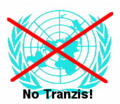We are developing the social individualist meta-context for the future. From the very serious to the extremely frivolous... lets see what is on the mind of the Samizdata people.
Samizdata, derived from Samizdat /n. - a system of clandestine publication of banned literature in the USSR [Russ.,= self-publishing house]
|
The day started off with ominous signs as I left the house, a raven seemed to be calling a warning from atop the church…

Even when I arrived at the appointed place, I found nervous animals, disquieted by a change in the ether…

And then, suddenly, he was there! The rumours were true! He had returned and the room exploded into chaos!

In no time at all, he was back to his old tricks as though he had never left…

Andrew Dodge is back in London after his long exile in the colonies. God save us all!
As mentioned by R. C. Dean in an earlier article, the fact that EU policy is a major contributor to poverty in the Third World is finally starting to attract the attention it deserves. Many of Samizdata.net’s contributors have written in the past about the true price of protectionism and just who pays it.
Well now the The Centre for the New Europe has released a devastating paper that shows the claims of the Euro-statist elite to care for the world’s ‘have-nots’ for what they are: complete lies
Key Findings
- 6,600 people die every day in the world because of the trading rules of the EU. That is 275 people every hour.
- In other words, one person dies every 13 seconds somewhere in the world – mainly in Africa – because the European Union does not act on trade as it talks.
- If Africa could increase its share of world trade by just one per cent, it would earn an additional £49 billion a year. This would be enough to lift 128 million people out of extreme poverty. The EU’s trade barriers are directly responsible for Africa’s inability to increase its trade and thus for keeping Africa in poverty.
- If the poorest countries as a whole could increase their share of world exports by five per cent, that would generate £248 billion or $350 billion, raising millions more out of extreme poverty.
The complete paper can be downloaded from the main CNE site

Whilst sitting in a café surrounded by all of Bratislava’s Central European splendours and pondering how to get my treasures back to London…


…I could not but notice how all that history has interesting effects on the local arts…




Of course there are many local inspirations, not just the historical ones…




We decided to just try and take my new prized possession, my dragon, on the aeroplane with us. The artist obligingly packed it up in a most expert manner and we just took it with us as luggage, praying that it did not get crushed on the bus to Vienna or smashed into matchsticks by the baggage handlers…

…Arriving back in London  , we took a cab home and were welcomed by a very liberty-friendly message en-route… , we took a cab home and were welcomed by a very liberty-friendly message en-route…

Finally back home, we unpacked the new love of my life and is was… perfect!

Nice to be back but I shall certainly visit Bratislava again  … for the artworks of course … for the artworks of course 
Continuing my tales of Bratislava…
One of the things I very much enjoyed was the food. Although a short visit of only a few days does not give my views much authority, I have to say that both the home cooked meals and restaurant victuals were really rather good. One restaurant in particular was so good that I would have to say it would make my top ten must-eat-at places anywhere I have been… and all modesty aside I am extremely well travelled. This splendid place is called Café Zichy (formerly known by the name ‘Harmonia’). The venison in plum sauce with puréed chestnut was sublime. I was also introduced to the splendours of Demänovka, the excellent local firewater. The service at the Zichy was informative and agreeable without being intrusive: the place is a mandatory visit when in Bratislava!
Another thing that caught my eye…

…is that if you pay attention, you can find interesting and idiosyncratic art all over the place. Some of it very modern and some of it very old indeed…

But as I have mentioned before, Bratislava is filled with the sort of distractions that can make a person miss such details…

During my meandering around the cobbled streets, I encountered the first dragon I saw in Bratislava: a rather fine golden dragon which happens to be the mark of a pharmacy…

…and although I did not know it yet, it was the first indication I was about to fall madly in love, but more about that later 
Whenever I visit a new city, I always pay attention to the graffiti and political posters as I always believe it is worth seeing what ‘the others’ are saying. When I was passing though Vienna airport a few days earlier the only graffiti I saw was ‘EU NEIN’ engraved on the flusher in the men’s room…

Compared to Croatia, Slovenia and Bosnia-Herzegovina (the other part of the Slavic world in which I have considerable experience), Bratislava has much less of a problem with graffiti or flyposting. It was mildy interesting therefore that in Slovakia the only political posters I saw were for a rather incoherent group of ‘anarchists’ and a nameless call (in English) to ‘smash the reds’…


Warning sign number one… these ‘anarchists’ are waving their flags on May Day.
There may have been other political posters but the distractions on the streets of Bratislava are many and varied…

I saw an interesting sign of the transformations going on in Slovakia when I visited a carpet warehouse with my hostess, the mother of my travelling companion. The warehouse was until quite recently the Factory of MDZ (Medzinarodny Den Zien, or International Women’s Day)… an old style communist industrial collective. I was much amused to see that under its new capitalist management, it was advertising Astroturf, a quintessentially American product.

During our meanderings, we wandered past a rather typical gated Austro-Hungarian era courtyard and noticed a small sign directing us to something called ‘Gallery F7’. Being curious by nature, we went in and found at the far end, an exhibition of the work of an artist called Jozef Borovka… and that is where I well and truly fell in love.
Borovka’s work was just fantastic. He is an extremely talented Slovak artist working in wood, stone, oil and pen and I would have happily walked off with almost every item that was on exhibit. As it happened, that day was the last day of the show and so we contacted the artist and arranged to purchase several of his works. The first we acquired was a superb and whimsical bison made of 5 kg (11 lbs) of stone with antlers made from a coat hook, the second was a pen and ink drawing of a rural house in the Slovak countryside, the third was a female torso in mahogany on a large brass base…

…and the last piece was a table… but, oh, what a table! This was the true object of my undying affections: the finest Dragon in Bratislava.
However seeing as we were flying on Air Berlin, which is El Cheapo No Frills Cattle Class Airlines personified, actually getting a honking great cherry wood, mahogany, glass and brass table that was very fragile back to London was rather a major problem. We explored shipping it back via DHL but that proved to be prohibitive on the grounds of price, so we retired to the many and wonderful cafés of Bratislava to ponder what to do and admire the passing parade…

More to follow…
Following some rather personally difficult times, I was recently whisked off to foreign parts by a friend who decided I very badly needed to get out of London for a while to get my head together. And so, a day after a funeral and one of the worst days of my life here in London, I found myself on an Air Berlin BAe-146 aeroplane heading, indirectly, for Bratislava, the capital city of the Slovak Republic.
Due to the hasty nature of the flying arrangements, my friend and I travelled via Mönchengladbach (that’s near Düsseldorf, in Germany). As it happens, that 30 minute stop-over allowed me to see something to delight any aviation enthusiast… an airworthy Junkers 52!

From Germany we headed to Vienna, where we were picked up by my traveling companion’s mother and thence a short drive across the Austrian border to Bratislava.
Although I was very keen on getting a break from my surroundings, given that my friend had never really described Bratislava fondly (having grown up under communism does have that effect), I must say I did not have very high expectations, given the grey and bleak preamble I had received (I suspect my colleague is in no danger of being offered a job by the Slovak Tourist Agency).
Blimey… I was really in for a surprise!
Although surrounded by the expected outer layer of ghastly public housing (but then are any major cities on the west not similarly blighted?), Bratislava’s inner city is simply gorgeous.

The inner city is almost entirely unspoiled by the pox of post war modern architecture, yet it far from being a moribund museum: it positively pulsates with life and exuberance. → Continue reading: A trip to Bratislava
This constant intervention by government in tasks that belong to the
individual must cease … Day by day the doctrines and practices of a
paternal government are speciously and tentatively expanding over the
country, and the habit of popular thought is unhappily becoming
accustomed to them.
– Senator Thos S. Bayard to Congress, April 1884
(with thanks to David Goldstone)
A cascade of power blackouts have hit the north eastern USA and parts of Canada, causing widespread chaos. It was also reported that due to the power cuts, the United Nations building in New York City has been closed.
So, not entirely bad news then.

…that can be found over on www.bureaucrash.com
Which reminds me of my favourite picture of Che Guevara, that achingly cool totalitarian pop icon…

As you sow, so shall you reap
The latest flash adventure by our most splendid Dissident Frogman shows the correct application for the wonders of modern technology in Iraq.
Ignore the warning and…press the Red Button in the main column of the blog. Pure genius.

This article on White Rose is rather interesting and really rather heartening…
The Irish Council for Civil Liberties says it will prosecute any priests found distributing or quoting the Pope’s anti-gay document for hate crimes.
I have long feared incremental statism more than revolutionary statism, because revolutions are easy to notice and thus easy to shoot at and, more importantly, get support from other people when you do. Incremental diminution of liberty however falls within the ‘boiling frog’ syndrome. By the time people notice, it is too late.
Now I really do not care what the Catholic Church has to say about gays or whatever… that is matter for practicing Catholics, not a well and truly lapsed one like me. But I am rather interested in anything which could well cause a major collision between civil society and the state.
You see, what I see here is that sooner or later, the Irish state is going to find itself confronted by a Catholic Priest who loudly proclaims in unambiguous language what the state defines as ‘hate speech’ by strongly depreciating homosexual relationships… and the state will be faced with in effect prosecuting someone for being a Catholic and following ex cathedra Catholic doctrines to the letter.
And then all of a sudden, when it becomes clear that the state has decided it will give itself a force-backed say in what gets said from the pulpits of Catholic Churches, millions of people who are voluntary members of a civil non-state social organization called The Roman Catholic Church are going to have to look long and hard at how they see the state. I could not ask for better grounds on which to draw up an army for that particular fight.
I think rather a lot of them will come to the conclusion that…The state is not your friend.
More and faster please.
Someone has recently set up a syndicated account for Samizdata.net over on LiveJournal… if XML feeds are something you are interested in, check it out!
If anyone doubted that the libertarian ‘vibe’ is seen by many as powerful and attractive, then the fact so many people who represent its antithesis keep trying to hijack the term to mean ‘someone opposed to liberty’ should make it clear that the word ‘libertarian’ is hot, hot, hot (i.e. much as the term ‘liberal’ within the Anglosphere was hijacked when it was hot and which has now come to mean ‘illiberal’, which is to say, socialist).
I have argued before that Libertarian Socialism is an oxymoron… well the same applies to Libertarian National Socialism. But then given that National Socialism and Socialism are just tactical variants within the same old statist collectivist class of political philosophy, it is hardly surprising the arguments as to why one is absurd to call itself libertarian applies equally well to the other.
The only real difference is that the Nazi variety of socialist collectivists just have better tailors and a worse press. The use of the term by overt Nazis is really no more bizarre than its use by Noam Chomsky, that socialist apologist for Pol Pot and several other of the world’s collectivist mass murderers.
|
Who Are We? The Samizdata people are a bunch of sinister and heavily armed globalist illuminati who seek to infect the entire world with the values of personal liberty and several property. Amongst our many crimes is a sense of humour and the intermittent use of British spelling.
We are also a varied group made up of social individualists, classical liberals, whigs, libertarians, extropians, futurists, ‘Porcupines’, Karl Popper fetishists, recovering neo-conservatives, crazed Ayn Rand worshipers, over-caffeinated Virginia Postrel devotees, witty Frédéric Bastiat wannabes, cypherpunks, minarchists, kritarchists and wild-eyed anarcho-capitalists from Britain, North America, Australia and Europe.
|







































